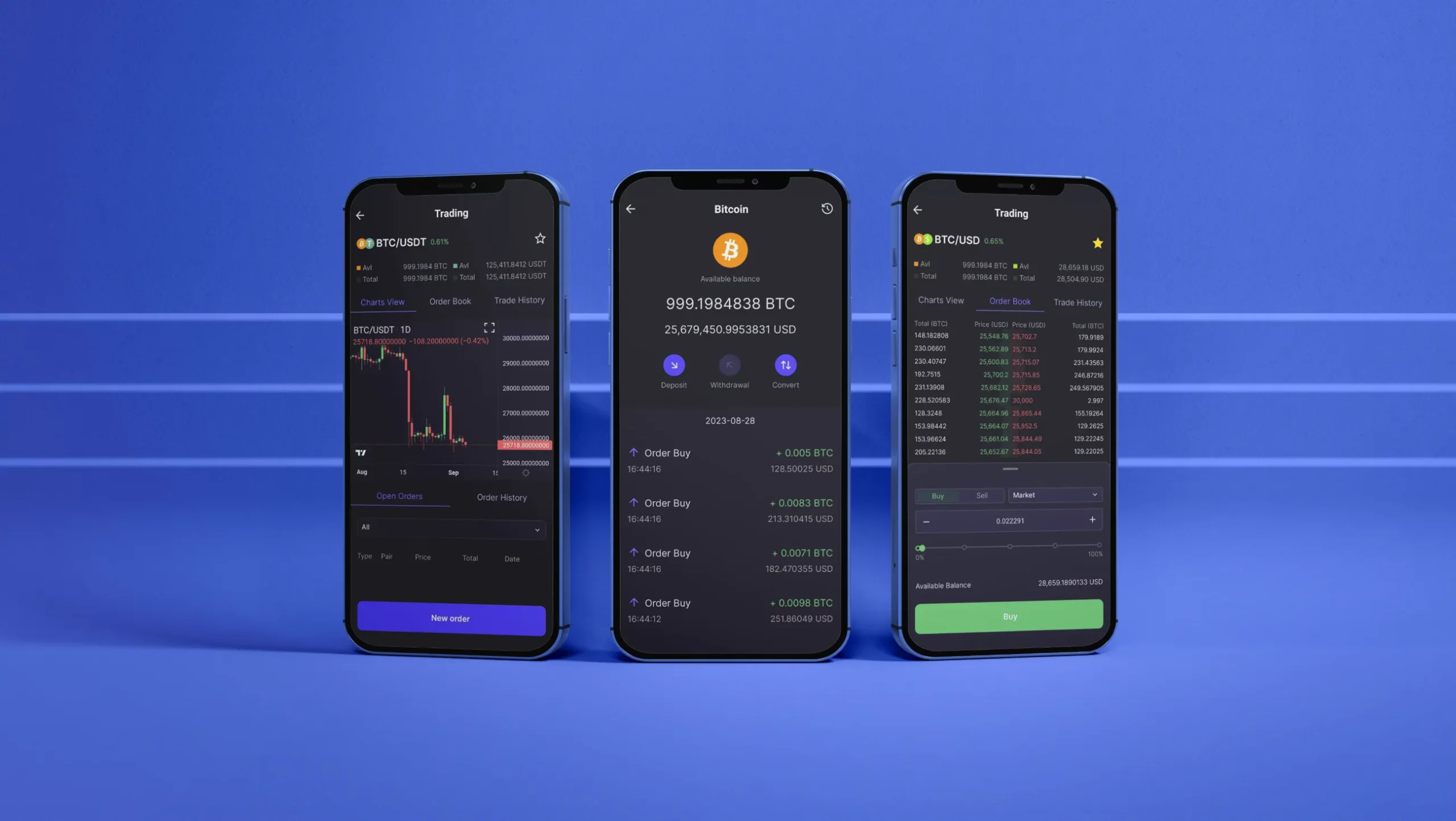- Crypto Solutions
- By business model
- By auction model
- Services
- Case studies
- Contact
In recent years, the application of cryptocurrencies by individuals and businesses has surged, as has the frequency of related theft and fraud.
As follows from the Europol Spotlight report Cryptocurrencies: Tracing The Evolution Of Criminal Finances, cases of illicit crypto operations are growing as new methods of fraud go beyond traditional tactics. In 2021, illegal transactions totalled 14 billion USD, an increase of 78% from 2020.
As of July 2022, nearly 2 billion USD in crypto was stolen through hacks, for reference under 1.2 billion USD at the same point in 2021.
To combat crypto-related crime, many jurisdictions got down to regulating crypto exchanges and other crypto services, just like in the traditional financial sector. It means that cryptocurrency exchanges must now follow AML (anti-money laundering) regulations and therefore carry out KYC (Know Your Customer) procedures.
Learn what AML/KYC in crypto looks like within Merkeleon, a development company that specializes in top-notch technology for the crypto market. This article is prepared in collaboration with Sumsub, an all-in-one verification platform for FinTech.
A quick note. The article describes regulatory mechanisms for crypto exchanges, yet the information here may bear on other types of crypto services, since they, too, are becoming regulated.
What is KYC?
The Know Your Customer (KYC) check is the process of identifying and verifying a customer’s identity based on a reliable and independent source. It is part of the CDD (Customer Due Diligence) process, which is a legal obligation in many jurisdictions.
The requirement is integrated into national AML/CFT laws that implement an international standard set by the FATF (Financial Action Task Force), a global anti-money laundering watchdog.
KYC checks usually contain the following steps:
1. Identification: This is where client’s data is gathered: name, address, place, and date of birth, identity document details, and additional data.
2. Liveness check: This process determines whether the client is a real person.
3. Verification: It involves cross-comparing personal data with government-issued documents or information obtained from a reliable source independent of the client.
4. Address verification: This step settles whether the client comes from their claimed locality.
KYC in crypto exchanges
KYC in crypto exchanges assists in many ways. Here is what it does:
- Combats money laundering and terrorist financing
- Prevents fraud activity and identity theft
- Ensures transparency and customer trust
- Ensures trust from counterparties
Most importantly, KYC covers part of the requirements for virtual asset service providers (VASPs) laid out in FATF Recommendation 16, otherwise known as the Travel Rule. The Travel Rule requires financial institutions and VASPs to collect personal data on participants in transactions exceeding 1,000 USD/EUR. Many countries target to adopt the Travel Rule in 2023, meaning crypto platforms need to set the stage for its implementation. Should they fail to take instructions, they may be fined, with tariffs drastically varied from one jurisdiction to another. To thwart this outcome, we turn to our partner Sumsub to help us prepare.
Currently, a great deal of crypto environments doesn’t allow clients to purchase digital money or withdraw funds, unless they prove their identity. Nevertheless, there are exchanges with limited deposits. In other words, a client can deposit or withdraw a small sum without KYC. However, activities on a non-KYC platform have the following risks:
- Increased vulnerability to fraudsters and money launderers due to weaker protection
- Higher fees due to exposure to money-laundering risks
Pros of KYC for crypto exchanges
Anything associated with data collection in crypto, always draws in skepticism, as the concept contradicts the initially anonymous nature of blockchain technology. But blockchain is a coin with two sides. On the one side, it is privacy that makes the technology so attractive, but on the flip side, it is this exact privacy that makes money laundering easy to occur. That’s why the benefits of KYC in crypto exchanges cannot be overstated. They include:
- Reduced risk of regulatory fines
- Customer trust
- Flawless reputation
- Reduced risk of money laundering
What is AML?
Anti-money laundering describes the actions taken by financial institutions and VASPS to inhibit criminals from disguising illegally obtained funds as legitimate income. AML is a much broader concept that blankets KYC.
AML measures include:
- Customer Due Diligence (including Simplified Due Diligence or Enhanced Due Diligence when needed)
- Transaction monitoring
- Risk assessment
- Ongoing monitoring
- Sanction screening
- Detection and reporting of suspicious activity (i.e., submitting Suspicious Activity Reports to local financial intelligence units)
- Organizational measures, such as appointing a money-laundering reporting officer, designing corresponding policies, and providing personnel workshops.
Some will argue: blockchain transparency allows users to track the history of any transaction. Then, why, on earth, do crypto exchanges need AML regulations? It is true that the transaction information is public. Along with that, it identifies neither a trader’s name nor a transaction purpose, making it hard to link a given wallet with a given person.
Moreover, fraudsters use mixers, tumblers, money mules, and other techniques to complicate tracking. It implies that any operation can be active in forbidden activities, like terrorism, phishing, or ransom. The AML mechanism creates conditions to eliminate cases of no-go digital currency entering wallets.
How to choose a KYC provider for crypto exchange?
Crypto exchanges can also conduct a manual verification of customers, but this process is slow, resource-consuming, and ineffective. This is where reliable KYC software can help. With an abundant offer of providers, it can be difficult to choose the one, so here are a few aspects to keep in mind:
1. Time of verification: Consider the duration of a check and remember that inspections must be both thorough and quick.
2. Recognition of special symbols in documents: Look for software that can process a wide variety of documents, alphabets (Cyrillic, Latin, hieroglyphs), and special characters.
3. Technical aspects: To pick quality KYC software, ask the following questions:
- How easy is it to embed a KYC algorithm into the interface?
- How frequently are the API libraries refreshed?
- Is KYC adaptable to your software and programming language?
4. Reputation of the KYC product: Your provider must have a clean reputation, with no suspicious cases or scandals in their past and present.
5. Complexity and versatility of the system: Go with a KYC provider that can offer a variety of services for you not to juggle multiple providers.
6. Travel Rule service: You will benefit from a KYC solution that detects VASP-to-VASP transactions, monitors an account type, checks for sanction violations and does AML screening. It is especially relevant as governments are enforcing FATF Recommendation 16.
If you are hesitant about the quality of a solution, request its demo, invite legal and compliance teams to estimate the product’s compatibility. Demos are invaluable as they let you see how KYC looks from the user’s perspective, plus, you can assess its convenience for the compliance team. Trial versions generally give you a good understanding of how the KYC process can work in your crypto project; still, bear in mind that most demos do not include the full suite of features.
All in all, KYC makes a cryptocurrency exchange a safe environment where everyone can transact money securely. KYC and AML operations deliver security and create the ground to work with fiat and virtual money, enter the global market, and collaborate with financial organizations. Simultaneously, KYC helps prevent crimes such as money laundering and identity theft, protects customer accounts from unauthorized third-party access, and allows to avoid reputational damage.
Also read how do crypto exchanges make money and how to choose the best jurisdiction for cryptocurrency business.







